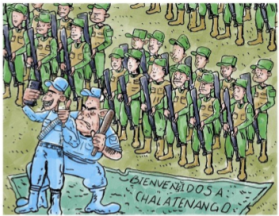Latin America Goes Left
January 2007 El Salvador Watch
A broad political shift is afoot in Latin America, and though the mainstream media in the US is loath to admit it, the latter part of 2006 cemented the leftist trend. Overwhelming victories by leftist economist Rafael Correa in Ecuador (November) and Hugo Chavez in Venezuela (early December) proved that anti-Bush and anti-free market forces continued on the rise. Negotiations for a CAFTA-style free trade agreement between the U.S. and Ecuador have been canceled, and though agreements with Peru and Colombia are pending, the political shift has all but ended Bushs hopes for a hemisphere-wide Free Trade Area of the Americas (FTAA).
Meanwhile, the victory of Daniel Ortega in Novembers Nicaraguan presidential election demonstrated the failure of the US State Department to consistently influence Latin American election results. Ortegas Sandinista party won despite tactics of U.S. intervention reminiscent of those employed during the 2004 Salvadoran presidential campaign. However, the fear campaign that led to the victory of ARENA in El Salvador in 2004 was successfully echoed in the still-disputed victory of Mexican conservative Felipe Calerdon in Julys presidential election, and to a lesser extent by the squeaker victory of centrist candidate Oscar Arias in Costa Rica over his anti-CAFTA counterpart, Otton Solis, last spring. As these examples illustrate, U.S. support of pro-business, right-wing candidates has not gone away, nor has its influence in the region totally dissipated.
Thus, despite some electoral outcomes favorable to Washington in 2006, the region-wide trend appears to have turned toward the left. The victories of Correa in Ecuador and Chavez in Venezuela are especially significant, as the majority of South American countries are now governed by Left or center-left governments, including Bolivia, Argentina, Brazil, Uruguay, Chile and the aforementioned Ecuador and Venezuela. Such steps forward give social movements throughout the region and leftist political parties like the FMLN hope for future victories.
Giving the resources back to the people
So what are these leftist governments actually doing to empower people within their countries? Bolivia and Venezuela have held constituent assemblies in recent years and Ecuador promises to follow meaning that citizens have the opportunity to elect representatives from political parties, grassroots organizations, and indigenous
groups to re-write their nations constitutions. The new constitutions in these countries, once written, represent the concerns and needs of a vast majority of the population, making them contemporary, living documents reflecting the needs of the people. Another change being made by the governments on the left in Latin America is the nationalization or partial-nationalization of natural resources such as oil in Venezuela and natural gas in Bolivia. For the people of Latin America, this means that the revenues generated from these industries will go back to the people.
In late November, President Evo Morales MAS (Movement Toward Socialism) government in Bolivia passed a National Agrarian Reform Service Law (IRNA) which focuses on distribution of unused land to landless farmers. The landless peasants movement (MST) in Bolivia modeled after the MST in Brazil has been demanding such changes for years but had been met with tear gas, riot police and little sympathy from corrupt government officials of previous administrations. However, in November of this year the Morales government supported a march of farmers, campesinos, and worker organizations that arrived in the Bolivian capitol of La Paz to demand these changes.
The land distribution law was passed by the Bolivian Senate even though opposition party members boycotted the session. IRNA makes land that "is not serving a social or economic purpose" subject to redistribution, and includes environmental preserves as serving a valid land use. Land grants are prohibited from being granted to the officials making the reforms, and small properties, campesino farms, and indigenous communities are all exempt from property taxes and protected from expropriation.
The land reform will benefit thousands of poor Bolivian families and attempts to address and quell the tension around the distribution of land. It also symbolizes political accountability, as Morales had promised to redistribute 23 million hectares during his presidential campaign. To pass this law, the MAS worked to mobilize social organizations around the country. This is the support that Morales and other left-leaning governments in Latin America will need in confronting the right-wing backlash to their progressive policies, not to mention future U.S. intervention.
Hope for the future
In January, CISPES joined the FMLN and other leftist parties and leaders from throughout the hemisphere at the Foro de Sao Paulo in San Salvador. Riding a wave of change, these groups plan to build a strategy based on successes in Venezuela and Bolivia as well as address a new model of trade and regional integration that would reduce dependence on the U.S. Chavez, Morales, Cubas Fidel Castro, and now Nicaraugas Daniel Ortega have signed the Bolivarian Alternative for the Americas (ALBA), a direct challenge to the free market intransigence of the FTAA. Regional meetings like the Foro have provided space to continue building this alternative model.
Finally, the FMLN is already beginning its run towards victory in the presidential, legislative and municipal elections of 2009, with renewed expectations to join the parade of change. g

 "I am a CISPES supporter because continuing to fight for social justice and a more people-centered country means continuing the dream and sacrifice of thousands of my fellow Salvadorans who died for that vision.” - Padre Carlos, New York City
"I am a CISPES supporter because continuing to fight for social justice and a more people-centered country means continuing the dream and sacrifice of thousands of my fellow Salvadorans who died for that vision.” - Padre Carlos, New York City

